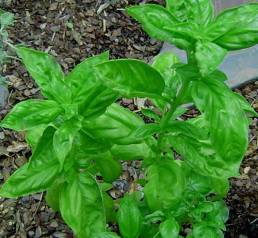Basil HerbBasil herb also known as Holy Basil, is a very aromatic plant with many branches and leaves. The leaves are most commonly used in cooking and how many of us grow it just for that reason? A member of the mint family it can grow up to 4 feet tall. (I however cannot get it to grow beyond 8 inches or so!) Health Benefits of Basil HerbThis herb has been shown to help in the treatment of a range of symptoms, including:
Studies on animals have shown the following health benefits:
Additional research shows that there could be other benefits such as lowering the level of serum cortisol. This particular hormone is secreted by the adrenal glands and is responsible for our response to stress. It helps regulate blood pressure and helps with sugar levels. Basil can also boost the activity of some white blood cells. Specifically neutrophils which are a type of white blood cell that fight off acute viral infections. When you get a cold, neutrophils generally rise in production to help fight off the virus. Excess stress can reduct neutrophil counts. This could be why the herb has been shown to have both anti-viral and anti-bacterial properties. Believe it or not, this herb can help fight off ringworm. Basil has anti-fungal properties when applied topically. You can find Basil oil The health benefits of Basil herb are due to the miriad of vitamins, nutrients, flavonoids and antioxidants present. Basil one of the most popular cooking herbs and can also be used as an essential oil. About BasilIt is an aromatic, versatile, easy to grow, culinary herb common to many cultural types of cooking including Italian, French, Thai and Vietnamese. Basil varieties encompass lemmon, anise cinnamon and sweet. Basil is usually chopped when added to items such as salad, but is is also added to hot dishes. The leaves will wilt very fast and at that point can be made into a Pesto sauce with olive oil and garlic. Basil is found in many gardens and grows best in warm, dry climates. It does flower and the blooms produce all summer long. By cutting the buds off before full flower you will get more leaves and the plant will become bushy. Although fantastic in cooking when fresh, it can be harvested in the fall and dried. There are many components of Basil that are responsible for the healing benefits.
The essential oils of Basil oil Another benefit of basil is that it decreases cholesterol levels thereby promoting heart health. The magnesium in the herb is a smooth muscle relaxant which can help with GI health. When infused as a tea, it relieves constipation, GI cramps, indigestion and nausea. As an herb, Basil is impressive with all the benefits it has to offer. It is an anti-inflammatory in addition to being and anti-biotic, lowers cholesterol and soothes skin irritations. It is also very popular as a culiary herb. Additional considerationsGenerally, basil herb is completely safe, both for children and the elderly. There is thought to be a link that exists between taking the herb and lowered fertility. Those that are trying to conceive should only take it with care. Basil Herb is a great herb that can certainly help with the treatment of several ailments, including some that are chronic. It has been in use for thousands of years in some areas of the world and will continue to be so for many years to come. | | |
|
Information
Treatment
How To
Legal
| ||
|
| Home Page | Privacy Policy |Medical Disclaimer |Written by Mary Kay Betz |
Copyright©
2008-2012
| ||


